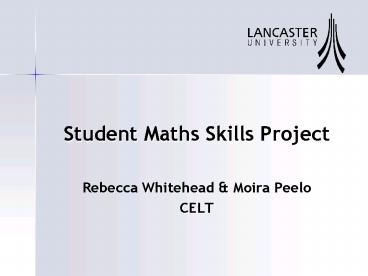Student Maths Skills Project - PowerPoint PPT Presentation
1 / 19
Title:
Student Maths Skills Project
Description:
Rebecca Whitehead Project Officer, 1 year half time (CELT) Moira Peelo Project Manager, Co-ordinator of Student Learning Development Centre (CELT) ... – PowerPoint PPT presentation
Number of Views:34
Avg rating:3.0/5.0
Title: Student Maths Skills Project
1
- Student Maths Skills Project
- Rebecca Whitehead Moira Peelo
- CELT
2
Why?
- The question has been asked Are students less
well prepared for the maths and quantitative
skills in their degrees? - Many departments are responding to this issue
with innovative work but it is difficult to share
this information between departments - TQEF funding was provided for a one year half
time project to investigate this issue
3
Aims of the project
- To identify all departments that teach maths or
quantitative methods to students (other than
those on Mathematics degree schemes) - To explore departments responses to students
learning needs and problems - To identify good practice at department level for
dissemination. - To conduct a study of students perceptions and
of the problems they face
4
The People Involved
- Rebecca Whitehead Project Officer, 1 year half
time (CELT) - Moira Peelo Project Manager, Co-ordinator of
Student Learning Development Centre (CELT)
5
Steering Group
- Prof Mandy Chetwynd (Chair, Pro Vice Chancellor)
- Dr Andrew Folkard (Geography)
- Dr Catherine Fritz (Educational Research)
- Dr Moira Peelo (CELT)
- Dr Alan Thomson (Biological Sciences)
- Dr Michael Winstanley (History)
- Dr Rebecca Whitehead (CELT)
- Dr Michael Wright (Management School)
6
Overview of last years work
- Pilot work
- Student interviews
- Focus groups
- Staff interviews
- Audit work
- Student questionnaire
- Online questionnaire for undergraduate students
7
Methodology Questionnaire
- We used QMP (Question Mark Perception)
- Took a focussed and strategic approach to get to
the students - Very successful approach
8
Overview of data
- Questionnaire was completed by 825 students (just
over 10 of the undergraduate population) - FASS 242 responses (6)
- FST 278 responses (13)
- Management School 243 responses (13)
- The questionnaire included the question do you
use maths in your degree scheme? 535 of the 825
respondents said they did (280 said not and 10
were blank)
9
Students with problems (1)
- One trigger for the project was concern about
students who were struggling with quantitative
work - In the questionnaire the students were asked if
they have had any problems with mathematical or
quantitative work in their degrees (they only
answered this question if they actually use
maths, 535 students)
10
Students with problems (2)
- Students were offered five categories to rate
their problems (huge problems, some problems, not
many problems, very few problems, no problems) - For the purposes of analysis we collapsed these
categories into 3 students with huge problems,
some problems and very few or no problems
11
Numbers
- Students with huge problems 22
- Students with some problems 172
- Rest of the students with few or no problems
329
12
Lectures
13
What does this show?
- Those with huge problems were unlikely to find
lectures helpful - Those with some problems were likely to find
lectures quite helpful or adequate - Finally those with few problems were most likely
to find lectures helpful.
14
Common theme
- The majority of students were in agreement that
lectures were not the best place to teach maths. - They agreed that the format for teaching should
be - Explanation
- Practice
- Feedback
- More practice
15
Student voice
- It doesnt work in a lecture style environment,
you need to be able to ask a lot of questions and
work through examples and told where you went
wrong. It would work better in tutorial groups - I think that lectures on Maths are not very
useful because its easier to learn Maths when
you are actually doing it yourself. Then you can
develop your understanding.
16
Student voice (2)
- Everyone on my course agrees the best style of
teaching maths is this Go through the work in
lectures, have a workshop where you try questions
similar to the homework, and then have weekly
coursework. The coursework should be clearly
marked and solutions should be made available
online with COMPLETED notes.
17
What do staff think?
- Need smaller classes and more time. Tutorials
used to be 8-10 students for 2 hours. Now there
is 1 hour for 120 students. They are meant to
work in small groups but this is not practical in
a lecture theatre. There is a real issue with the
lack of space. It is difficult to find a space
where 120 students can work in small groups at
tables rather than banked lecture theatres. - From a lecturer in the Management School
18
Conclusion
- Clearly there is some agreement between staff and
students about the appropriateness of the lecture
method in teaching - Large numbers of students do find that they can
learn something from lectures - However there must be different approaches for
different groups of students teaching problem
of large, mixed ability classes
19
Website
- If you are interested in any of the work from the
Maths Project our report can be found online - http//www.lancs.ac.uk/depts/celt/sldc/materials/n
umbers.htm































